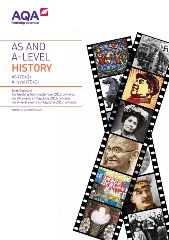2O Democracy and Nazism: Germany, 1918–1945
This option provides for the study in depth of a period of German history during which a newly developed democratic form of government gave way to a dictatorial Nazi regime. It explores political concepts such as 'right' and 'left', nationalism and liberalism as well as ideological concepts such as racialism, anti-Semitism and Social Darwinism. It also encourages reflection on how governments work and the problems of democratic states as well as consideration of what creates and sustains a dictatorship.
Part one: the Weimar Republic, 1918–1933
The Establishment and early years of Weimar, 1918–1924
- The impact of war and the political crises of October to November 1918; the context for the establishment of the Weimar Constitution; terms, strengths and weaknesses
- The Peace Settlement: expectations and reality; terms and problems; attitudes within Germany and abroad
- Economic and social issues: post-war legacy and the state of the German economy and society; reparations, inflation and hyperinflation; the invasion of the Ruhr and its economic impact; social welfare and the social impact of hyperinflation
- Political instability and extremism; risings on the left and right, including the Kapp Putsch; the political impact of the invasion of the Ruhr; the Munich Putsch; problems of coalition government and the state of the Republic by 1924
The 'Golden Age' of the Weimar Republic, 1924–1928
- Economic developments: Stresemann; the Dawes Plan; industry, agriculture and the extent of recovery; the reparations issue and the Young Plan
- Social developments: social welfare reforms; the development of Weimar culture; art, architecture, music, theatre, literature and film; living standards and lifestyles
- Political developments and the workings of democracy: President Hindenburg; parties ; elections and attitudes to the Republic from the elites and other social groups; the position of the extremists, including the Nazis and Communists; the extent of political stability
- Germany’s international position; Stresemann's foreign policy aims and achievements including: Locarno; the League of Nations; the Treaty of Berlin; the end of allied occupation and the pursuit of disarmament
The Collapse of Democracy, 1928–1933
- The economic, social and political impact of the Depression: elections; governments and policies
- The appeal of Nazism and Communism; the tactics and fortunes of the extremist parties, including the role of propaganda
- Hindenburg, Papen, Schleicher and the 'backstairs intrigue' leading to Hitler’s appointment as chancellor
- Political developments: the Reichstag Fire; parties and elections; the Enabling Act and the end of democracy; the state of Germany by March 1933
Part two: Nazi Germany, 1933–1945 (A-level only)
The Nazi Dictatorship, 1933–1939 (A-level only)
- Hitler’s consolidation of power, March 1933–1934: governmental and administrative change and the establishment of the one-party state; the Night of the Long Knives and the impact of the death of President Hindenburg
- The 'Terror State': the police, including the SS and Gestapo; the courts; extent, effectiveness and limitations of opposition and non-conformity; propaganda: aims, methods and impact; extent of totalitarianism
- Economic policies and the degree of economic recovery; Schacht; Goering; the industrial elites
- Social policies: young people; women; workers; the churches; the degree of Volksgemeinschaft; benefits and drawbacks of Nazi rule
The Racial State, 1933–1941 (A-level only)
- The radicalisation of the state: Nazi racial ideology; policies towards the mentally ill, asocials, homosexuals, members of religious sects, the Roma and Sinti
- Anti-Semitism: policies and actions towards the Jews, including the boycott of Jewish shops and the Nuremberg Laws
- The development of anti-Semitic policies and actions; the effect of the Anschluss; Reichkristallnacht; emigration; the impact of the war against Poland
- The treatment of Jews in the early years of war: the Einsatzgruppen; ghettos and deportations
The impact of War, 1939–1945 (A-level only)
- Rationing, indoctrination, propaganda and morale; the changing impact of war on different sections of society including the elites, workers, women and youth
- The wartime economy and the work of Speer; the impact of bombing; the mobilisation of the labour force and prisoners of war
- Policies towards the Jews and the ‘untermenschen’ during wartime; the Wannsee Conference and the 'Final Solution'
- Opposition and resistance in wartime including students, churchmen, the army and civilian critics; assassination attempts and the July Bomb Plot; overview of the Nazi state by 1945
